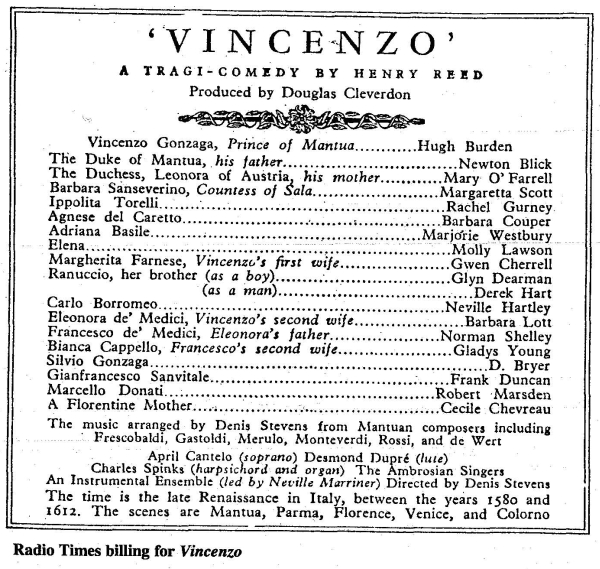From Denis Stevens' Monteverdi in Venice (Fairleigh Dickinson University Press, 2001), a facsimile of the billing in Radio Times (of May 27, 1955?) for Reed's radio play, Vincenzo (click to view full size):
Vincenzo, previously.
|
Billed for Vincenzo
A Little VincenzoOn March 29th, 1955, the BBC's Third Programme broadcast for the first time Henry Reed's radio play, Vincenzo. The play, advertised as a "tragi-comedy," was something of a prequel to Reed's 1952 The Great Desire I Had. Both plays recount episodes in the life of Duke Vincenzo I of Gonzaga (Wikipedia article), patron of the arts and ruler of the Italian Duchy of Mantua from 1587 to 1612.
The London Times called the play "splendidly acted," and "the happiest association of playwright and players" (March 31, 1955, p. 10). It was produced by Douglas Cleverdon, with music by Denis Stevens. It stars Hugh Burden (Internet Movie Database) as Vincenzo, Rachel Gurney as Ippolita Torelli (later of Upstairs, Downstairs), Gwen Cherrell as Margherita Farnese, Barbara Lott as Eleanora dé Medici, and Barbara Couper as Agnese del Ceretto. The music was arranged by Denis Stevens (Guardian obituary) from the work of Mantuan composers of the period, including Claudio Monteverdi, the Italian master who was Stevens' particular passion. Monteverdi's patron was none other than Duke Vincenzo. The play traces Vincenzo's life from his eighteenth year until his death in 1612, framed in "choric narration" (Savage, "The Radio Plays of Henry Reed") spoken by his wives and mistresses. In Poets of Great Britain and Ireland 1945-1960, vol. 27 of The Dictionary of Literary Biography (Detroit: Gale Research, 1984), Douglas Cleverdon says: ‘Vincenzo is a remarkable work. Its understanding of human character, its erotic power, and its deep compassion are conjoined with delicate satire and delicious comedy. The language ranges from enchanting descriptions of the rose gardens of Colorno to witty bantering between lovers or the biting invective of family quarrels or the anguish of love nobly controlled. There are scenes that haunt the memory: Francesco de Medici, Grand Duke of Tuscany, and his mistress Bianca Cappello lying together on their deathbed, unable to reach each other for one last kiss, but never renouncing their love though it condemned them to an eternity of damnation; or Vincenzo and his five-year-old Silvio sharing, entranced, the sufferings depicted in the seventeenth-century composer Monteverdi's "Lament of Ariadne" as she mourns the departure of Theseus. After Vincenzo explains that "in the end you will see that she is rescued and made happy by Bacchus, the god of wine," Silvio asks, "Are unhappy ladies always rescued from their sorrow by the god of wine?," and Vincenzo responds, "Very frequently, yes."’ (p. 280)A recording of the two-hour broadcast of Vincenzo is available from Schola Antiqua, a version produced by Stevens' Accademia Monteverdiana. Here, ladies and gentlemen, is a 20-minute audio clip, to get you started, opening with those 'enchanting descriptions of the rose gardens of Colorno': Vincenzo, by Henry Reed (8MB .mp3 file)
|
||||||||||||||||||||||||
|
|
|||||||||||||||||||||||||








